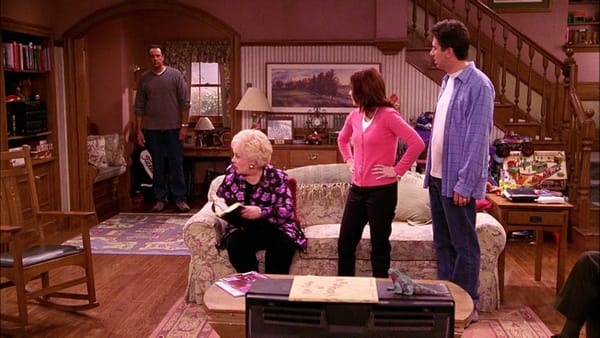Does anybody KNOW themselves? REALLY?
Or: Why do I struggle with the concept of interiority so much?

When I hired a freelance editor to read the first-ish draft of Woodworking (my novel, out March 25, 2025; available for pre-order soon!), she returned it with one major note: You're aware you can let people know what your characters are thinking and feeling, right?
I did know that. One of the great strengths of prose fiction is how it can delve intricately and delicately into a character's psychology, so you really figure out what makes them tick. The thing was: I thought I had already done a pretty great job of that by dropping in to the characters' brains roughly five times throughout the entire manuscript where I let the reader in on what a character was thinking or feeling.
While I initially worked in prose fiction, I had spent most of my post-college life working on scripts. In scripts, of course, you have to find ways to convey what a character is thinking and feeling via stage directions. Later, the director and actor will add their own spin on these ideas, but you're building the base that they'll construct their work atop. To tell them directly what is happening in the character's head is to rob them of their agency in developing that character via the collaborative process.
All of this is to say: I really thought letting the reader in on the characters' thought processes a handful of times was going above and beyond. But no! The novel lets you do this as often as you want and ideally as often as possible. Even as I write this now, I'm bristling a little at that idea. Isn't one of the pleasures of reading fiction letting yourself into the character's head and figuring out things about them that they, themselves, don't know?
Thus began my long war with interiority.
Now, interiority is both necessary and important. Without it, a novel is just a weirdly formatted screenplay. Indeed, one of my favorite novels of the last decade is all interiority in a way I find thrilling. But too often, "interiority" can become shorthand for "explaining the character to a degree of understanding they would not possess." Too little interiority keeps the reader at arm's length, but too much of it has perversely the same effect. Suddenly, you're given no space to draw conclusions on your own. The book has already drawn them for you.
(Sidebar: Of course, there is a sweet spot where the character's interiority and the character's actions cut against each other in a way that gives the reader plenty of room to have fun figuring out who this person really is. A lot of my favorite books operate in that space!)
Consider becoming a paid subscriber: For as little as $5 a month, you can support this newsletter and help keep it rolling. Paid subscribers get a weekly post on Fridays that goes out even on weeks the Wednesday newsletter is dark, access to the full archives, a monthly mailbag, and a link to the Episodes Discord server. There will be some other fun treats along the way. Click the button to learn more!
I'm thinking about all of this because I recently finished reading a novel I liked but wanted to like more. (I'm not going to name it because I don't like directly criticizing other writers' work.) The bulk of the book's plot is about a young woman better coming to understand the toxic emotional patterns she has tolerated in her life since she was a child, then vowing to break herself out of that cycle for once and for all. We spend just a handful of days with the character, and readers will know human beings well enough to realize that the protagonist will probably have to learn this lesson over and over and over again across her life. But the book treats her discovery as such a big epiphany that it forms the entirety of the climax. We are meant to believe she has reached a new level of understanding of herself that will carry her forward into a new chapter of her life.
To be clear: This is totally fine! People do have dramatic epiphanies, sometimes all at once, and they do shift their behavior because of those epiphanies, even if that shift is only temporary. You can learn your lesson and then unlearn it and then learn it all over again, and one of the times you learn it can be the stuff of good or even great fiction.
I still found the climax frustrating. The character suddenly understood a thing because she was looking at it, and she drew the right conclusion from doing so. The truth she sought was right in front of her all along; she didn't really have to go looking anywhere else. And maybe this is just my deeply traumatized brain talking, but I just don't think people work that way. I think people are great mysteries to themselves, and even when you have a character reach a dramatic epiphany, you have to account for that. Indeed, sometimes knowing yourself well can leave you believing you are powerless to help yourself.
Of course, what I'm talking about here extends beyond fiction. For a lot of people, having a major epiphany really does lead them to a greater understanding of themselves, one they might carry forward for the rest of their lives. Yet I often feel like every major epiphany I have only leads me to a greater understanding of the huge, clockwork operation in my brain designed to hide my true feelings and motivations from myself. I have had a lot of therapy that mostly involves circling some of the same ideas and never landing the plane. I have whole sections of my brain where I am, like, "I know what's going on there, and I can tell you in great detail what's going on there, but I am never going to actually deal with it because it would be too painful."
I'm both an abuse survivor and a trans woman who somehow gutted out 30+ years in the closet, so my experience is decidedly atypical. But I don't think it's that atypical, all the same? Does anybody truly know themselves? And if they do, do they ever actually do anything about it? Presumably! But it still feels like an uphill struggle where an easy answer can be quite seductive.
I should cut myself some slack! I really have had epiphanies that have changed everything – not least of which is the thing where I'm publishing this newsletter under the name Emily instead of another one. And even the pieces of my psyche that have involved much more taxing, grinding work have led to real breakthroughs and peace of mind. I am a better, more stable person now than I was in early 2021, when I started pulling apart the terrible black hole at the center of my brain. It may have been slow, but I have come to know myself better.
Yet I think there's a seduction in the idea of knowing oneself all the same. A few years ago, I was talking with my therapist about a person I knew who was in the very early stages of trauma therapy. He seemed to have gotten stuck in the step where he came to understand what had happened to him and started assembling it into a narrative that made sense of his life. My therapist assured me how common this is. Once you know someone has wronged you, your brain wants to let you have unconditional forgiveness for all the bad things you've done. It's an easy trap to fall into, but the process is all about identifying the pain in your past, then healing the ways it has done harm to you and others, if you lashed out in some way at them.
So it's not that I think interiority is unnecessary or that I think you can't do really exciting things with it or that I don't understand that you can use it to highlight a contrast between who a person is and who they're perceived to be. It's that I think every thought I have, every feeling I feel, is perched above a vast, unknowable abyss that I am only gradually filling in. That is the work of a lifetime, and the work of fiction is only ever to capture a snapshot. People are mysteries to themselves except for the handful of moments when they are not, and those moments can make for some wonderful stories.
Programming note: I am headed to Vancouver for a few weeks, and I won't be filing Wednesday newsletters in that time! I will be back to y'all on August 14, probably with a new Kirsten & Natalie or something. If you are a paid subscriber, you'll be getting the Friday newsletters as you normally would. Are you going to miss me? Then there's a great way to see more of me!
This week's reading music: "Stories" by The Chakachas
The free edition of Episodes, which (usually) covers classic TV and film, is published most Wednesdays, and the subscriber-supported edition of Episodes, which covers more recent stuff, is published every Friday. It's written by Emily St. James. If you have suggested topics, please reply to the email version of this newsletter or comment (if you are a paid subscriber).




